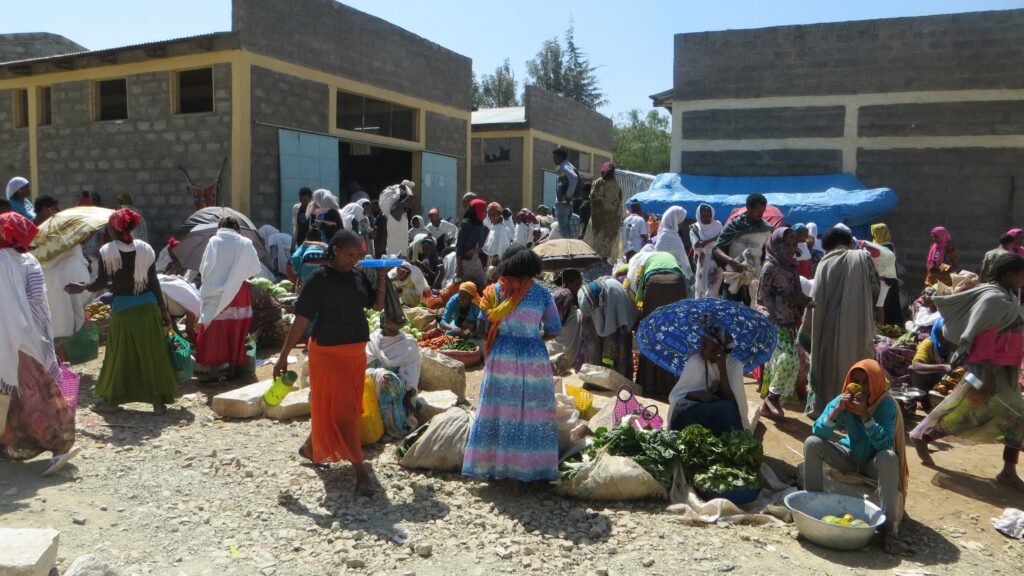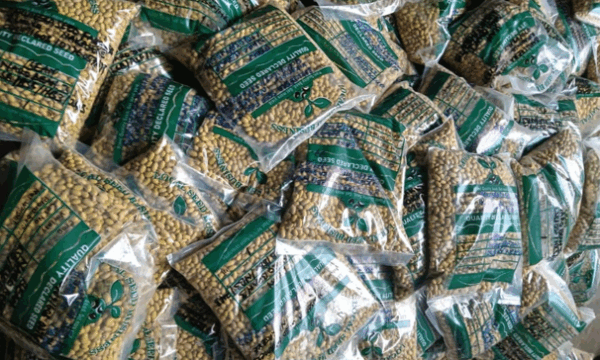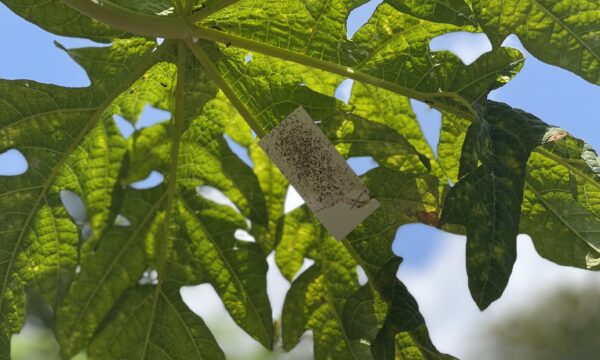
In the Tigray region of Ethiopia, village-based plant clinics have traditionally flourished. Running from 2014 to 2020, with the support of CABI and Ethiopia’s Ministry of Agriculture (MoA), the local government and community embraced the clinics. The regional government even expanded on their services. However, a two-year conflict in Northern Ethiopia interrupted plant clinic operations. The war resulted in plant doctors and trained experts moving away from the areas where they operated. And the plant clinics saw materials and resources damaged as a result of the war.
But in light of the previous local commitments and achievements, PlantwisePlus, in collaboration with MoA (Ethiopia) decided to allocate funding to reactivate the clinics in the region. Ethiopia’s agricultural sector is pivotal to its economy and food security. Here, many people are smallholder farmers, and agriculture contributes significantly to employment. Efforts to modernize the country’s farming systems are crucial. In the face of increasing threats from new and existing plant pests and diseases, improved crop health and pest management are important for safeguarding farmer livelihoods.
At the end of 2022, the conflict in the region came to an end. In 2023, PlantwisePlus and a partner organization (Tigray Bureau of Agriculture) investigated the status of plant clinics in Tigray. They looked at manpower, materials, and how to get the clinics back on track. To help re-establish the clinics, the team focused on training and resources, putting an action plan in place.
Getting the plant clinics back on track
Simple but necessary resources, including tables and chairs, were dispatched to the region. And a workshop was organized to conduct a refresher course for plant doctors and local experts. Dr Negussie Efa, a CABI scientist and country programmes manager, travelled to Tigray to deliver the training. Six trainers from MoA joined him. Together, they gave plant clinic training in Mekele City, the capital of Tigray, from 10-13 October 2023.
Attending from different districts and villages across the Tigray region, 79 participants (40 men and 39 women) joined the workshop. Two additional plant protection experts from MoA also attended.

The workshop’s objectives were to:
- Assess the plant clinics’ status, performance and potential for reactivation
- Discuss how to reactivate plant clinics in the region
- Strengthen local engagement for Plantwise in Tigray
- Provide a refresher course on selected topics from Plantwise modules one and two
Official opening of the plant clinic training
On behalf of MoA, Mrs Konjit Feleke, National Coordinator for Plantwise Ethiopia, welcomed the participants. She reaffirmed the ministry’s commitment to plant clinic operations in Tigray. Dr Eyasu Abreha heads Tigray’s Regional Bureau of Agriculture (BoA). He opened the workshop, expressing gratitude for the support provided by PlantwisePlus and MoA for reactivating the plant clinics. Dr Abreha noted how his Bureau recognized the importance of community-based plant clinics’ support. He praised their outreach to farming communities, helping them to quickly address farmers’ plant health problems.
He pledged BoA’s continued support for the initiative. And he promised they would make efforts to fully reactivate plant clinics and further expand their coverage. The war had a devastating impact. But, he urged the trainees to launch their clinic operations and ramp up efforts quickly. In this way, they can help to strengthen their farming communities once more.
Re-connecting with former plant doctors
Following the official opening, Dr Efa introduced the workshop’s agenda and objectives.
The participants were asked to provide updates on the status of their plant clinics. Almost all reported that materials had been damaged. They also explained that most trained plant doctors had left their operational areas. This meant plant clinics had come to a standstill following the onset of the war.
However, PlantwisePlus and MoA discovered that several people who had previously trained as plant doctors had also joined the October workshop. Furthermore, plant clinic electronic devices, such as tablets, had not been damaged or looted during the war. They had been kept safely at the regional office. So, the team put in place a plan to dispatch the existing devices back to plant clinics.
Refreshing the plant clinics’ training modules
The remaining days of the training were devoted to presentations about the revised training modules on diagnosis and giving advice for pest management. Almost all of the presentations from the two modules were delivered. And although time was short, discussions and question-and-answer sessions were held successfully.

PlantwisePlus took the opportunity to promote CABI’s digital tools and resources, including:
- CABI Academy
- CABI Bioprotection Portal
- the Fertilizer Optimizer Tool
- the Horizon Scanning Tool
- the Pest Diagnostic Simulator App
- the Pest Risk Analysis Tool
- the PlantwisePlus Factsheet Library
- and the PlantwisePlus Knowledge Bank
Regional officials encouraged participants to make good use of these resources. They recommended using them to build their capacities and provide improved services.
At the end of the workshop, participants were given electronic and hard copies of reference materials. The resources included pest management decision guides, fact sheets and plant clinic record forms.
Finally, the training team discussed how to reactivate and resume plant clinic operations in the region. Tigray region has shown immense support for plant clinics and plant doctors, and is committed to resuming operations and getting back on track.
Plant clinics ready for future operation
The Deputy Head of Tigray BoA, Mr Alemberhan Harifeyu, closed the workshop. He reaffirmed that his office would keep the clinics running and even seek to expand them. The deputy head underscored the importance of village-based plant clinics. They reach people with plant health advice who might otherwise be unable to access it. He urged all plant doctors and experts to integrate plant clinic activities into their regular work. He noted the current situation in the region. And he reiterated that continued support from MoA and CABI would help them get the initiative off the ground again.
Participants of the training workshop agreed to a set of actions and next steps. They also discussed strengthening the link between the plant clinics and existing government structures and initiatives. The workshop was co-financed by Plantwise and MoA budget, demonstrating government’s commitment to continue owning and supporting the plant clinics.
Find out more
PlantwisePlus: Farmer Advisory pathway
Village-based plant clinics benefit Ethiopian farmers
CABI welcomes Ethiopia as member country
PlantwisePlus gratefully acknowledges the financial support of the Directorate-General for International Cooperation (DGIS), Netherlands; European Commission Directorate General for International Partnerships (INTPA, EU); the Foreign, Commonwealth & Development Office (FCDO), United Kingdom; and the Swiss Agency for Development and Cooperation (SDC).
All photos courtesy of the author.
Related News & Blogs
Training Sri Lanka’s agro-dealers in pesticide risk reduction
Agro-dealers provide vital support to Sri Lanka’s farmers. These agricultural input suppliers are often the first point of contact for smallholders who need advice on plant protection products. However, agro-dealers often lack formal training in safer…
3 July 2025




